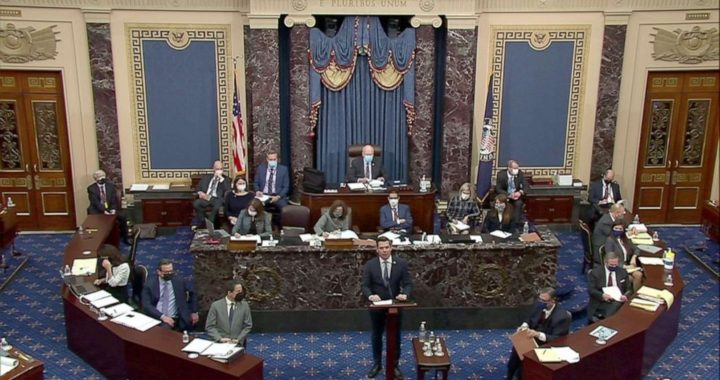When Republican senators make their decision at the conclusion of Donald Trump’s second impeachment trial, it is not Trump’s future that they will be deciding, said two former Republican operatives.
Instead, senators will be deciding the future of the Republican party itself, said Sarah Longwell, former Republican strategist and leader of an anti-Trump organization. Longwell and Tim Miller – former Republican campaign advisor – spoke Friday at a Cleveland City Club virtual forum titled “The Republican Reckoning: The Future of the Party Post-Trump.”
“This week, Republican senators will determine their party’s future,” said Longwell. “If senators acquit Trump, he will remain the leader of the party for the foreseeable future.”
Yet, if Trump is convicted – an outcome that seems ever-more unlikely – it is not at all certain that the Republican party can move in a new direction, said Longwell. There is no obvious leader for the party if Trump loses his place.
At this point, however, the choice is not up to Republican senators, said Miller. Regardless of the outcome of the impeachment trial, “the voters have chosen Donald Trump for them.”
Miller and Longwell are co-founders of Republican Voters Against Trump, a coalition of Republicans, former Republicans, conservatives, and former Trump voters who did not support Donald Trump in the 2020 election.
While Trump’s character defects render him unfit for the presidency, said Longwell, his committed supporters now comprise as much as thirty percent of Republican voters. The problem for non-Trump Republicans – the traditional business wing of the party – is how to dissociate themselves from Trump while holding on to his voters, especially the ten million or so voters who had not been Republican voters previously.
“These voters are not true Republicans,” said Longwell. “They are low-propensity voters – voters who never voted before.”
Republican leaders fear the loss of those voters, especially now since Trump’s character and performance have driven away more moderate Republicans. There is no real risk to disappointing moderate Republicans, said Miller, because for the most part they are already gone – the moderates that remain are committed Republicans – these are the voters that rejected Trump but still voted for Republican candidates in down-ballot races.
The political risk of confronting Trump – voting to convict him – is far higher than the political risk of acquitting him. “That’s the political calculus,” said Miller.
Republican leaders believe that the loss of moderate voters is harmful, but not fatal, said Miller. They believe that with the structural advantage the electoral college provides and with the advantages they have seized through aggressive gerrymandering, they can continue to win elections as a minority party.
Which is why Republican state legislators this year have already introduced more than 100 bills aimed at restricting voting. That’s the one thing that unites the party, said Miller. “Both wings oppose Democrat efforts to expand voting rights.”
But the traditional wing of the party is less committed to voter suppression than is the Trump wing, said Longwell. “The Trump wing of the party is anti-democratic. They object to free and fair elections. They truly want less voting. They are threat to our democracy.”
It is not just moderate Republican voters who are abandoning the party. Centrist office-holders like Senators Pat Toomey of Pennsylvania and Robert Portman of Ohio are declining to run for re-election. They are leaving, said Longwell, “because they don’t know how to exist as traditional Republicans when all the voters want is for them to fully support Trump.”
Meanwhile, the Trump wing has gained control of virtually every state Republican party organization. Right now, said Miller, “all fifty state Republican parties are run by crazy people.”
While Trump is the unchallenged leader of the party’s nationalist/populist wing, he did not pull the party away from traditional Republican values like fiscal restraint and international cooperation.
The road to Trump, said Miller, began with Pat Buchanan during the Reagan administration. By 1992, Buchanan was strong enough to challenge an incumbent president – George H. W. Bush – for the party’s nomination. Buchanan lost, but he won nearly 24 percent of the vote. Neo-Nazi David Duke also challenged Bush, but Duke received only about one percent of the votes. Still, the candidacies of the two right-wing challengers and the popularity of Buchanan’s favored issues of economic nationalism, sealing the border, and isolationism marked the start of the Republican party’s shift away from traditional concerns.
Later the Tea Party movement and the popularity of Sarah Palin would provide further evidence of widening divisions within the party. By 2016, the nationalist/populist wing which had coalesced around Trump represented a third of the party.
During this time the establishment wing of the party failed to address the growing popularity of nationalism/populism through a combination of conscious decisions and mistakes, said Miller.
Now, the party is in a bind of its own making.
Whether Trump’s influence wans now or later, the party has no obvious successor. Longwell believes that Nikki Haley, who has been generally supportive of Trump but who has broken with him on some issues might be able to lead a reunified party,
But Miller believes the party can only be led by a person who has not been associated with Trump or the Never-Trump movement.
February 13, 2021
